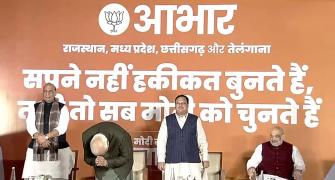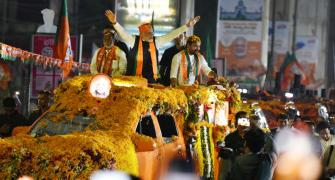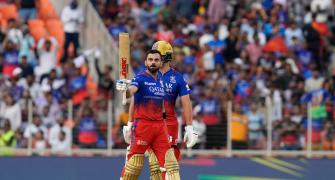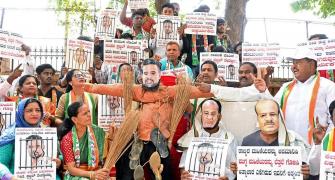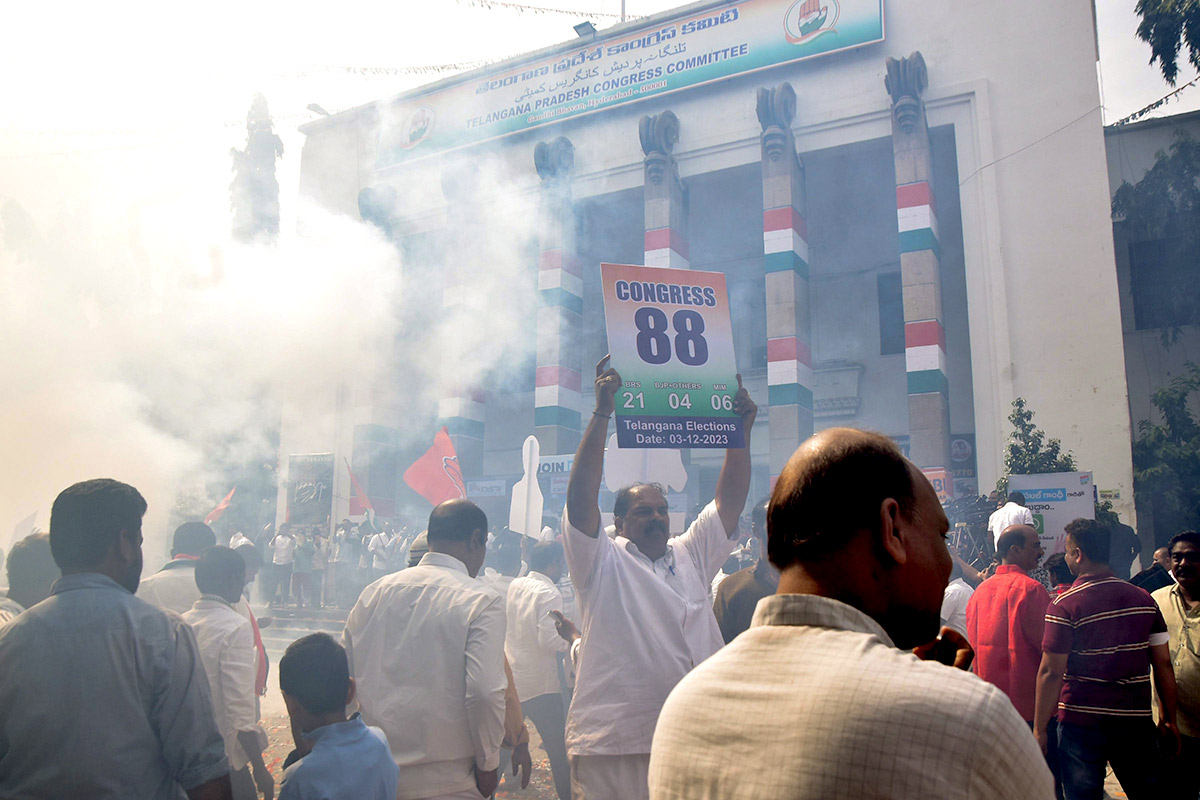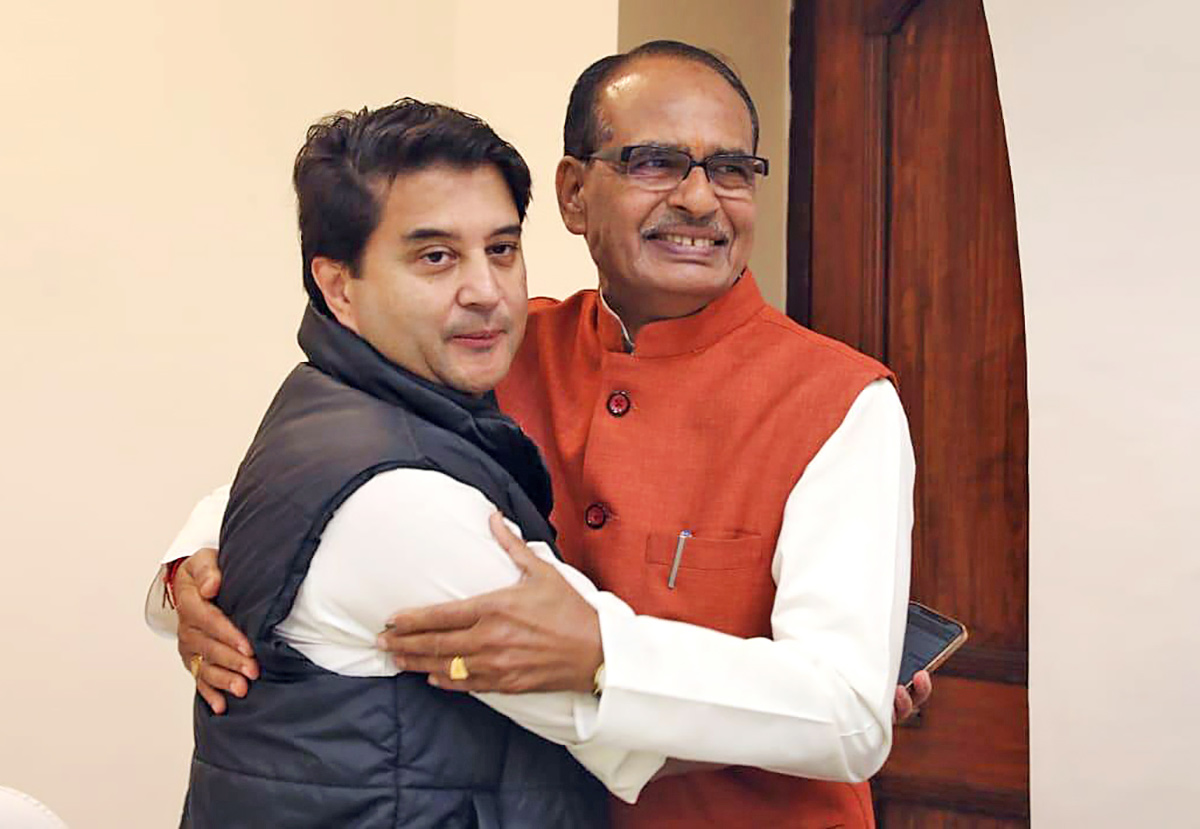By keeping the Sanatana Dharma row alive and adding the Ayodhya temple consecration scheduled for January 22 and adding the free darshan promise from four polled states to the entire country, the BJP may have a self-fulfilling concoction, predicts N Sathiya Moorthy.

Whether the impact was real and direct or not, campaigning for the recent five-state assembly elections did in fact bring out the best and worst in southern Tamil Nadu's Dravidian politics, nay, what the ruling DMK in the state has titled as the 'Dravidian model'.
Thus you had the main victor Bharatiya Janata Party taking on Tamil Nadu Minister and Chief Minister M K Stalin's son, Udhayanidhi Stalin, on his criticism of 'Sanatana Dharma' Hinduism and at the same time adopting the state government's social welfare measures without acknowledging them, that too after none other than Prime Minister Narendra Modi calling them all revdi, or freebies, when it is not election time anywhere in the country.
In a way, the BJP's victory in the three Hindi heartland states of Chhattisgarh, Madhya Pradesh and Rajasthan with the party snatching power from the Congress rival in two states in what essentially was a one-to-one fight has a profound meaning for the Lok Sabha elections.
After the Janata Party victory of 1977, there is evidence on the ground that you can rule India on legit grounds and through democratic elections with the backing of the Hindi heartland.

It becomes even more significant after the Congress rival taking back Telangana after ten years of K Chandrasekhar Rao's rule.
Going back in time, if the BJP had originally supported the demand for a separate Telangana, which ultimately the Congress government of then prime minister Dr Manmohan Singh granted almost overnight through a midnight declaration of then Union home minister P Chidambaram, there was a strategy behind it.
As per the BJP calculations of the time, after a term or two for the Telangana Rashtra Samithi, since rechristened as Bharat Rashtra Samithi under KCR, the state could become theirs, given the substantial Muslim presence and the 'inevitable domination' of anti-Muslim sentiment among majority Hindu voters.
The election results now have proved otherwise. By dilly-dallying on corruption issues relating to the BRS leaders, and especially giving the impression that it was using the case against KCR's daughter Kavitha, to arm-twist the party than to hold it accountable, the BJP gave away the state to the Congress on a platter.
By taking a clear stand against the BRS, unlike the BJP, the Congress made it despite not having one too many strong leaders in the state.
This also opens up possibilities in neighbouring Andhra Pradesh, where assembly polls are due before the Lok Sabha polls. It will now be left the Election Commission to decide on holding it separately or along with the Lok Sabha election.

The BJP does not have any government or early hopes across south India, barring being the junior partner in the Union Territory of Puducherry, where the NR Congress of Chief Minister N Rangaswamy holds sway.
The NR Congress broke away from the Congress parent a decade or so ago, and no one is contemplating a patch-up now or ever. That may leave the BJP feel safe.
Prior to the BJP's electoral victories in the three northern states, the NRC might have considered choosing a 'secular' path to contest the Lok Sabha polls on its own but now it might have lost the appetite to do so.
But then, no one is talking about the BJP and the ruling YSR Congress of Chief Minister Y S Jagan Mohan Reddy doing a back-handed deal for the coming elections despite all the unconditional support it has offered the Modi government in the two Houses of Parliament.
It does not make electoral sense as almost all YSR Congress voters are wedded to the traditional Congress ideology as Maharashtra's Sharad Pawar once found himself in, after breaking away from the Congress and considered moving closer to then ruling BJP at the Centre under Atal Bihari Vajpayee and Lal Kishinchand Advani -- but gave up the idea.
The immediate question for electoral interpretation is this: Considering that the Congress continues to be weaker in Andhra Pradesh than even in Telangana and the forgotten TDP of former chief minister Nara Chandrababu Naidu hoping for a comeback, how far could a weak and non-existent BJP influence the election results, and which way?
Zilch is the answer at present, but then, the Telangana elections would have proved for the BJP that it cannot hope to hunt with the hounds and run with the hares, at least in the south if it had to make an electoral impact even if only the distant future in mind.
Does it mean that the BJP-ruled Centre would once again unleash agencies like the ED, IT and CBI on the YSR Congress in the run-up to the twin polls in Andhra or hold it back for parliamentary support for some of the crucial legislative measures it may want to carry out before the Lok Sabha polls?
Rather, after the BRS's 'Trishanku politics' in Telangana, would Jagan want to be seen as backing the BJP in Parliament even while attacking it on the streets?
The question applies equally to the ruling Biju Janata Dal in Odisha, where Chief Minister Naveen Patnaik has made a fine-art of the same, but could come unstuck some time.

The five-state elections became more interesting and challenging after the BJP as the ruling party lost the Karnataka assembly polls to the Congress, earlier this year.
Here, the BJP had snatched the government from the Congress-Janata Dal-S ally which had formed a coalition after the assembly polls five years earlier.
It did the same trick in Madhya Pradesh too. Thus, the Congress had hoped that the people of MP, like those in Karnataka, would punish the defectors and also the party that had engineered those defections. It did not happen that way. That was not to be.
If however, after the assembly polls the BJP and the JD-S which were daggers drawn, have hastily formed an alliance for facing the Lok Sabha polls in the state together, it is not without electoral logic.
The combined vote-share of the two parties, 46.29 per cent (BJP: 36, JD-U: 13.29) is more than the ruling Congress's 42.88 per cent in the assembly elections.
It is another matter if such arithmetic calculations alone are enough to upset the Congress apple-cart in the state that is known for the BJP's success in engineering defections, post-poll.
Thus will remain the fate of the Congress government until after the Lok Sabha poll, in Karnataka and maybe Himachal Pradesh, if not in Telangana -- the only three states where the party is in power after the loss of three north Indian states.

Thus, the dye may have been cast for the Lok Sabha elections, or so it seems.
First and foremost, the ruling BJP at the Centre has only to tweak its electoral promises, building on the premises adopted for the successful assembly polls in the North this time round.
The socio-political mix has proved just right, going at least by a UP Congress leader who attributed the BJP rival's victory in the three north Indian states.
By keeping the Sanatana Dharma row alive and adding the Ayodhya temple consecration scheduled for January 22 and adding the free darshan promise from the four polled states to the entire country, the BJP may have a self-fulfilling concoction.
If that is to address the voter's emotional quotient and effectively so, social welfare programmes, promise of the more recent cash doles for (all) women as MP's BJP Chief Minister Shivraj Singh Chauhan had done, to all women across the country is something that the BJP may be tempted to take up.
Going by the speed and determination of the Modi dispensation, they may promise it early on and also implement it well before the Lok Sabha polls. This will be in addition to extending Modi's free food grains programme for the whole country by five more years alongside the cash-transfers of every other kind.
There is no denying the socio-electoral impact of such schemes. Given however the decades-old Tamil Nadu experience, the Indian voter has the habit of forgetting whatever is already in their kitty and expecting more of the same.
These flows from the conviction that whoever is elected to power dare not withdraw the welfare schemes already in force. This implies that if the political Opposition can convince that they would add more welfare schemes than already, they may stand a chance.
The list could include free breakfast scheme -- as mid-day meals is already there in most states -- free bicycles, free laptops, etc, all of which Tamil Nadu had innovated as a part of their tireless efforts at social uplift with continual focus on the trickle-down effect.

What does it all mean for the DMK's Dravidian model and Minister Udhayanidhi?
As Udhayanidhi has been claiming Modi has been 'making my name known' across the country by taking up his (controversial) views on Sanatana Dharma in his campaign speeches in Rajasthan (and also Madhya Pradesh, Chhattisgarh and Telangana).
It is true of senior BJP leaders Rajnath Singh and Amit A Shah, who had started off the Sanatana Dharma campaign and had also sought to link the Congress in these states to its DMK ally in Tamil Nadu.
In a way, it was an extremely unlikely campaign-theme for the DMK in Tamil Nadu, to begin with.
The millennium kids that the party is targeting now through all those welfare measures along with those for their parental and grandparental generations just do not relate to the theme, one way or the other.
Rather, if they relate, it relates to their belief in god, if not religion. For most, the issue does not exist as they do not know about it, and also do not care about it, one way or the other.
Two and even more personal, Udhayanidhi's mother Durga Stalin is known to be a devout Hindu, who does not miss offering worship in temples across the state and outside.
She has thus been visiting the Balaji temple in Tirupati and the Sri Krishna temple in Guruvayur, Kerala.
Durga Stalin also travelled to Varanasi to perform certain last rites for her father-in-law M Karunanidhi weeks after the latter's death in 2018.
It is another matter that ironically, or otherwise, Udhayanidhi has been focussing near-exclusively on defending himself and the party's perceived views on Sanatana Dharma that belonged in his late grandfather Karunanidhi's decades-old political career to the exclusion of the positive side of the Dravidian model that the BJP has been adopting, like the Congress predecessor at the Centre.
It is another matter that barring Udhayanidhi, no other DMK leader is taking up the cause.
More importantly, the party has never ever seriously pointed to the adoption of the state's welfare schemes by the BJP elsewhere in the country now, either for straight implementation or as themes for poll campaign.
Yet, all of it has made Udhayanidhi's name and face recognition easier and faster than the 50 long years that father Stalin had to wait.
Even today, in the national capital and all state capitals, Stalin is known as the incumbent Tamil Nadu chief minister. In villages elsewhere in the country, his name might not be as familiar as should have been, given his being possibly the longest-serving politician in the country in his age group.
Thanks now to social media, in every language in every state, and also the traditional media that keeps telecasting and re-telecasting the criticism of Udhayanidhi and his views on Sanatana Dharma, by Modi (the most popular person in the country today) and his senior aides, has given an edge to the former.
It is another thing if it would be an electoral boon or a curse for the INDIA combine, as it may evolve in the aftermath of the five-day election results, especially if they adopt the caste census, as in Bihar, for their national manifesto -- and the DMK does enough work to claim ownership of reservations, dating it all back to a hundred years of the 'Dravidian model' and updated through the post-Independence decades, beginning with the First Amendment to the Constitution, as early as 1951.
N Sathiya Moorthy, veteran journalist and author, is a Chennai-based policy analyst and political commentator.
Feature Presentation: Ashish Narsale/Rediff.com

